- Home
- A. S. Byatt
Possession Page 16
Possession Read online
Page 16
I hit on something I believe when I wrote that I meant to be a Poet and a Poem. It may be that this is the desire of all reading women, as opposed to reading men, who wish to be poets and heroes, but might see the inditing of poetry in our peaceful age, as a sufficiently heroic act. No one wishes a man to be a Poem. That young girl in her muslin was a poem; cousin Ned wrote an execrable sonnet about the chaste sweetness of her face and the intuitive goodness shining in her walk. But I now think—it might have been better, might it not, to have held on to the desire to be a Poet? I could never write as well as Randolph, but then no one can or could, and so it was perhaps not worth considering as an objection to doing something.
Perhaps if I had made his life more difficult, he would have written less, or less freely. I cannot claim to be the midwife to genius, but if I have not facilitated, I have at least not, as many women might have done, prevented. This is a very small virtue to claim, a very negative achievement to hang my whole life on. Randolph, if he were to read this, would laugh me out of such morbid questioning, would tell me it is never too late, would cram his huge imagination into the snail-shell space of my tiny new accession of energy and tell me what is to be done. But he shan’t see this, and I will find a way—to be a very little more—there now I’m crying, as that girl might have cried. Enough.
Roland slid out of the Ash factory and went home before Cropper or Blackadder could return from lunch and ask him any awkward questions. He was annoyed with himself for creating a situation in which Cropper could discover Christabel’s name. Nothing was wasted on that sharp noticing mind.
The Putney basement was silent, sensuously entangled with the BM basement by its feline reek. Winter was darkly coming, and dark stains and some slow form of creeping life had appeared on the walls. It was hard to heat. There was no central heating, and Roland and Val had supplemented their one gas fire with paraffin stoves, so that the smell of petrol mingled with the smells of cat and mild mould. It was a cold petrol smell, not a burning one, and there was no smell of cooking, no burning onion nor warm curry powder. Val must be out. They could not afford to keep the hall stove lit in her absence. Roland, without taking his coat off, went to find a match. The wick was behind a cranky hinged door in the chimney, made of a transparent horny substance, smoke-stained and crackling. Roland turned the key, extruded a little wick and set it flaring with a low boom; he hastily closed the aperture, producing a steady blue inverted crescent of flame. There was something ancient and magical about the colour, a clear blue, touched with green and dense with purple.
There was a little heap of letters in the hall. Two for Val, one self-addressed. Three for him: a request for a library book, a card acknowledging receipt of an article sent to a learned journal, and a handwritten letter that was unfamiliar.
Dear Dr Michell,
I hope you will not have taken our silence for rudeness, or something worse. My husband has been making the inquiries he spoke of. He has consulted his solicitor, the Vicar, and our dear friend Jane Anstey who is a retired Deputy County Librarian. None of these had any very clear advice. Miss Anstey spoke very highly of Dr Bailey’s work and of the archive she looks after. She feels it would be entirely proper to allow Dr Bailey to read our treasure trove and give a preliminary opinion on it—especially as it was she who found it. I am writing to you too, since you were present at the finding, and expressed an interest in Randolph Henry Ash. Would you care to come and examine the papers with Dr Bailey, or if you would find this time-consuming suggest someone to come in your place? I appreciate that this would be more difficult for you, coming from London, than for Dr Bailey, who lives conveniently near Croysant le Wold. I would offer to accommodate you for a few days—though this has its difficulties, since we are as you will remember, confined to the ground floor, and the old house is woefully cold in winter. What do you think? How long do you imagine you will need to take stock of our find? Would a week be sufficient? We have visitors over Christmas but none over the New Year if you would care to make a foray to the Lincolnshire Wolds at that time.
I am still grateful for your gentlemanly and practical assistance on that field-edge. Let me know how you think it best to proceed.
Yours sincerely
Joan Bailey
Roland felt several things at once. Primary elation—a kind of vision of the bundle of dead letters come to rushing life like some huge warm eagle stirring. Irritation at the primacy Maud Bailey seemed to have assumed in the affair that had begun with the discovery of his purloined letter. Practical, calculating anxiety—how to accept the half-invitation to stay without revealing his own extreme poverty, which might make him appear an inadequately weighty person to be entrusted with the letter-reading. Fear of Val. Fear of Maud Bailey. Anxiety about Cropper and Blackadder and even Beatrice Nest. He wondered exactly why Lady Bailey had thought or suggested that he might want to suggest someone else to read the letters—fun, folly, or an edge of uncertainty about himself? How friendly was her gratitude? Did Maud want him there to read the letters?
Above his head at street level, he saw an angled aileron of a scarlet Porsche, its jaunty fin more or less at the upper edge of his window frame. A pair of very soft, clean glistening black shoes appeared, followed by impeccably creased matt charcoal pinstriped light woollen legs, followed by the beautifully cut lower hem of a jacket, its black vent revealing a scarlet silk lining, its open front revealing a flat muscular stomach under a finely-striped red and white shirt. Val’s legs followed, in powder-blue stockings and saxe-blue shoes, under the limp hem of a crêpey mustard-coloured dress, printed with blue moony flowers. The four feet advanced and retreated, retreated and advanced, the male feet insisting towards the basement stairs, the female feet resisting, parrying. Roland opened the door and went into the area, fired mostly by what always got him, pure curiosity as to what the top half looked like.
The shoulders and chest were as expected; the tie was knitted red and black silk. The face was oval. There were horn-rimmed glasses under a modified 1920s haircut, very short back and sides, moderately long over the brow, black.
“Hi,” said Roland.
“Oh,” said Val. “I thought you were in the Museum. This is Euan MacIntyre.”
Euan MacIntyre leaned over and gravely extended a hand downwards. There was something powerful about him, Pluto delivering Persephone at the gate of the underworld.
“I brought Val home. She wasn’t feeling very well. I thought she should lie down.”
His voice was clear and ringing, not Scots, full of what Roland might inaccurately have called toffee-nosed sounds, or plummy sounds, sounds he had spent his childhood learning to imitate derisorily, hooting, curtailed, drawling, chipping sounds that prickled his non-existent hackles with class hostility. He was obviously waiting to be asked in, with an ease which in earlier novels might have proclaimed the true gentleman, but to Roland and probably to Val suggested nosiness and their own shame. Val drifted slowly and faintly towards Roland.
“I’ll be all right. Thank you for the lift.”
“Any time.” He turned to Roland. “I hope we meet again.”
“Yes,” said Roland vaguely, backing down below Val’s descent.
The Porsche sped away.
“He fancies me,” said Val.
“Where did he spring from?”
“I’ve been typing things for him. Last Wills and Testaments. Deeds of Covenant. Opinions on this and that. He’s a solicitor. Bloss, Bloom, Trompett and MacIntyre. Respectable, not sharp, very successful. Office full of photographs of horses. He owns a leg of one, he says. He asked me to go to Newmarket.”
“What did you say?”
“Would you mind what I said?”
“It would do you good to have a day out,” Roland said, and wished he hadn’t.
“Listen to yourself. It would do you a lot of good. How repellently patronising.”
“Well, I’ve got no right to stop you, Val.”
“I told him you wouldn’
t like it.”
“Oh Val—”
“I should have told him you couldn’t care less. I should have gone.”
“I can’t see why you didn’t go.”
“Oh if you can’t see—”
“What has happened to us?”
“Too much confinement, too little money, too much anxiety and too young. You want to get rid of me.”
“You know that isn’t true. You know. I love you, Val. I just don’t give you a very good time.”
“I love you too. I’m sorry I’m so short-tempered and suspicious.”
She waited. He took hold of her. It was will and calculation, not desire. There were two ways out of this, a row or making love, and the second was more conducive to eventual dinner and a peaceful evening’s work and the eventual broaching of the Lincolnshire project.
“It’s suppertime,” said Val faintly.
Roland looked at his watch.
“No it isn’t. Anyway, there’s only ourselves to please. We used to do things spontaneously, remember. Pay no attention to clocks. We ought to put ourselves first, now and then.”
They undressed and cuddled together for cold comfort. At first Roland thought it was not going to work after all. There are certain things that cannot be done only on will power. The thought of the warm feathers of his letter-eagle produced a stirring. Val said, “I don’t want anyone but you, not really,” and it almost subsided again. He lit on an image, a woman in a library, a woman not naked but voluminously clothed, concealed in rustling silk and petticoats, fingers folded over the place where the tight black silk bodice met the springing skirts, a woman whose face was sweet and sad, a stiff bonnet framing loops of thick hair. Ellen Ash, constructed from Richmond’s sketch, reproduced in Cropper’s Great Ventriloquist. All Richmond’s women have a generic mouth, firm and fine and generous and serious, variable yet related to some ideal type. The mental vision of this woman, half-fantasy, half-photogravure, was efficacious. They comforted each other. Later he would be able to think of a way to ask about Lincoln without saying exactly where he was going or why.
8
All day snow fell
Snow fell all night
My silent lintel
Silted white
Inside a Creature—
Feathered—Bright—
With snowy Feature
Eyes of Light
Propounds—Delight.
—C. LAMOTTE
They faced each other over the packages in the library. It was bitterly cold; Roland felt as though he should never be warm again, and thought with longing of articles of clothing he had never had occasion to wear: knitted mittens, long johns, balaclava. Maud had driven out early and had arrived, keen and tense, before breakfast was over, well wrapped in tweed jacket and Aran wool sweater, with the bright hair, visible last night at dinner in the Baileys’ chilly hall, again wholly swallowed by a green silk knotted scarf. The library was stony and imposing, with thickets of carved foliage in its vaulted roof and a huge stone fireplace, swept and empty, with the Bailey arms, a solid tower and a small clump of trees, carved on its mantel. Gothic windows opened onto a frosty lawn; these were partly clear glass in leaded panes and partly richly stained Kelmscott glass, depicting, in central medallions, the building of a golden keep on a green hill, fortified and bedizened with banners, entered, in the central medallion, by a procession of knights and ladies on horseback. Along the top of the window ran a luxuriating rose tree, bearing both white and red flowers and blood red fruit together. Round the sides vines were rampant, carrying huge purple grape bunches on gilded stems amongst curling tendrils and veined spreading leaves. The books, behind glass, were leather-backed, orderly, apparently immobile and untouched.
There was a table in the middle, leather-topped and heavy, ink-stained and scratched, with two leather-seated armchairs. The leather had been red and was now brown and powdery, of the kind that leaves rusty traces on the clothes of those who sit there. In the centre of the table was an inkstand, with an empty silver pen tray, tarnished, and greenish glass vessels, containing dried black powder.
Joan Bailey, wheeling round the table, had laid the packages on it.
“I hope you’ll be comfortable. Do let me know if you need anything else. I would light the fire for you, but the chimneys haven’t been swept for generations—I’m afraid you’d suffocate with smoke, or else we’d set the whole house on fire. Are you warm enough?”
Maud, animated, assured her that they were. There was a faint flash of colour in her ivory cheeks. As though the cold brought out her proper life, as though she were at home in it.
“Then I’ll leave you to it. I long to see how you get on. I’ll make coffee at eleven. I’ll bring it to you.”
There was a frostiness between the two of them when Maud brought out her proposals for the way they should proceed. She had decided that they should each read the letters of the poet who interested them, and that they should agree conventions of recording their observations on index cards according to a system she was already using in the Women’s Resource Centre. Roland objected to this, partly because he felt he was being hustled, partly because he had a vision, which he now saw was ridiculous and romantic, of their two heads bent together over the manuscripts, following the story, sharing, he had supposed, the emotion. He pointed out that by Maud’s system they would lose any sense of the development of the narrative and Maud retorted robustly that they lived in a time which valued narrative uncertainty, that they could cross-refer later, and that anyway they had so little time, and what concerned her was primarily Christabel LaMotte. Roland agreed, since the time constraint was indeed crucial. So they worked for some time in silence, interrupted only by Lady Bailey bearing a thermos of coffee, and the odd request for information.
“Tell me,” said Roland, “did Blanche wear glasses?”
“I don’t know.”
“There’s a reference here to the glittering surfaces of her gaze. I’m sure it says surfaces in the plural.”
“She could have had glasses, or he could have been comparing her to a dragonfly or some other insect. He seems to have read Christabel’s insect poems. People were obsessed with insects at that time.”
“What did she really look like, Blanche?”
“No one really knows for certain. I imagine her very pale, but that’s only because of her name.”
At first Roland worked with the kind of concentrated curiosity with which he read anything at all by Randolph Ash. This curiosity was a kind of predictive familiarity; he knew the workings of the other man’s mind, he had read what he had read, he was possessed of his characteristic habits of syntax and stress. His mind could leap ahead and hear the rhythm of the unread as though he were the writer, hearing in his brain the ghost-rhythms of the as yet unwritten.
But with this reading, after a time—a very short time—the habitual pleasures of recognition and foresight gave way to a mounting sense of stress. This was primarily because the writer of the letters was himself under stress, confused by the object and recipient of his attentions. He found it difficult to fix this creature in his scheme of things. He asked for clarification and was answered, it appeared, with riddles. Roland, not in possession of the other side of the correspondence, could not even tell what riddles, and looked up increasingly at the perplexing woman on the other side of the table, who with silent industry and irritating deliberation was making minutely neat notes on her little fans of cards, pinning them together with silver hooks and pins, frowning.
Letters, Roland discovered, are a form of narrative that envisages no outcome, no closure. His time was a time of the dominance of narrative theories. Letters tell no story, because they do not know, from line to line, where they are going. If Maud had been less coldly hostile he would have pointed this out to her—as a matter of general interest—but she did not look up or meet his eye.
Letters, finally, exclude not only the reader as co-writer, or predictor, or guesser, but they exclude the
reader as reader; they are written, if they are true letters, for a reader. Roland had another thought; none of Randolph Henry Ash’s other correspondence had this quality. All was urbane, considerate, often witty, sometimes wise—but written wholly without urgent interest in the recipients, whether they were his publisher, his literary allies and rivals, or even—in the notes that survived—his wife. Who had destroyed much. She had written:
Who can endure to think of greedy hands furrowing through Dickens’s desk for his private papers, for these records of personal sentiment that were his and his only—not meant for public consumption—though now those who will not reread his marvellous books with true care will sup up his so-called Life in his Letters.
The truth was, Roland thought uneasily, these letters, these busy passionate letters, had never been written for him to read—as Ragnarök had, as Mummy Possest had, as the Lazarus poem had. They had been written for Christabel LaMotte.
… your intelligence, your marvellous quick wit—so that I may write to you as I write when I am alone, when I write my true writing, which is for everyone and no one—so that in me which has never addressed any private creature, feels at home with you. I say “at home”—what extraordinary folly—when you take pleasure in making me feel most unheimlich, as the Germans have it, least of all at home, but always on edge, always apprehensive of failure, always certain that I cannot appreciate your next striking thought or glancing shaft of wit. But poets don’t want homes—do they?—they are not creatures of hearths and firedogs, but of heaths and ranging hounds. Now tell me—do you suppose what I just wrote is the truth or a lie? You know, all poetry may be a cry of generalized love, for this, or that, or the universe—which must be loved in its particularity, not its generality, but for its universal life in every minute particular. I have always supposed it to be a cry of unsatisfied love—my dear—and so it may be indeed—for satisfaction may surfeit it and so it may die. I know many poets who write only when in an exalted state of mind which they compare to being in love, when they do not simply state, that they are in love, that they seek love—for this fresh damsel, or that lively young woman—in order to find a fresh metaphor, or a new bright vision of things in themselves. And to tell you the truth, I have always believed I cd diagnose this state of being in love, which they regard as most particular, as inspired by item, one pair of black eyes or indifferent blue, item, one graceful attitude of body or mind, item, one female history of some twenty-two years from, shall we say, 1821–1844—I have always believed this in love to be something of the most abstract masking itself under the particular forms of both lover and beloved. And Poet, who assumes and informs both. I wd have told you—no, I do tell you—friendship is rarer, more idiosyncratic, more individual and in every way more durable than this Love.

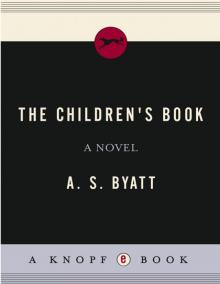 The Children's Book
The Children's Book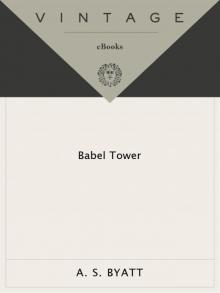 Babel Tower
Babel Tower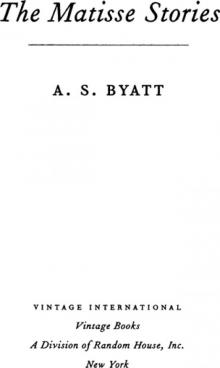 The Matisse Stories
The Matisse Stories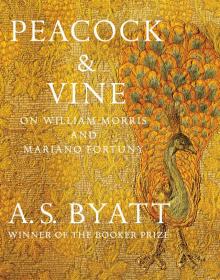 Peacock & Vine: On William Morris and Mariano Fortuny
Peacock & Vine: On William Morris and Mariano Fortuny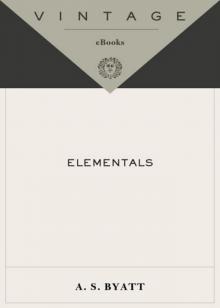 Elementals: Stories of Fire and Ice
Elementals: Stories of Fire and Ice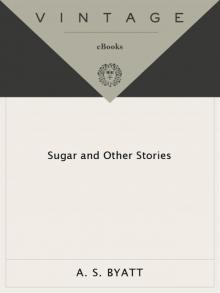 Sugar and Other Stories
Sugar and Other Stories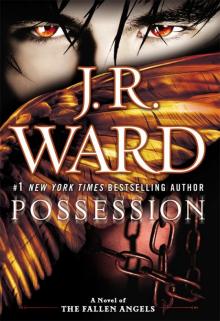 Possession
Possession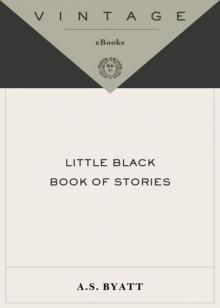 Little Black Book of Stories
Little Black Book of Stories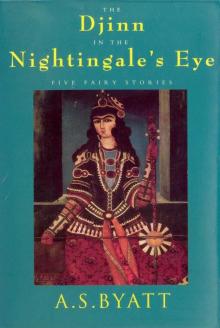 The Djinn in the Nightingale's Eye
The Djinn in the Nightingale's Eye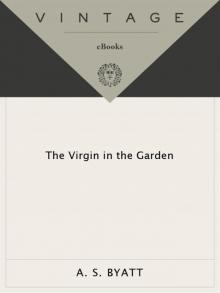 The Virgin in the Garden
The Virgin in the Garden The Game
The Game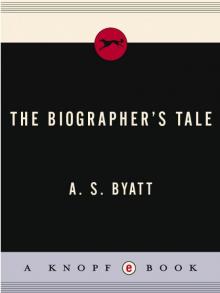 The Biographer's Tale
The Biographer's Tale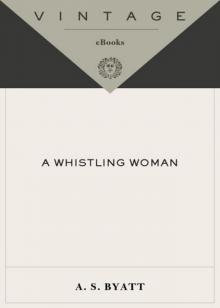 A Whistling Woman
A Whistling Woman Ragnarok
Ragnarok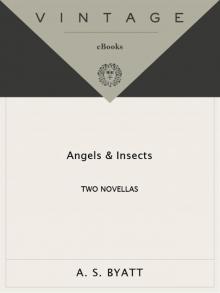 Angels & Insects: Two Novellas
Angels & Insects: Two Novellas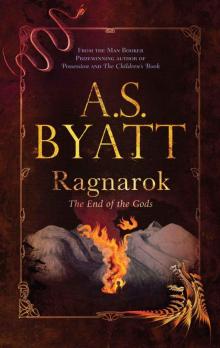 Ragnarok: the End of the Gods (Myths)
Ragnarok: the End of the Gods (Myths)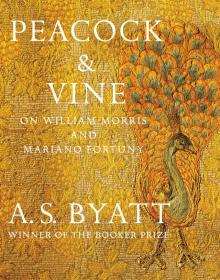 Peacock & Vine
Peacock & Vine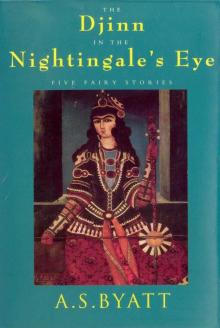 The Djinn in the Nightingale's Eye (Vintage International)
The Djinn in the Nightingale's Eye (Vintage International)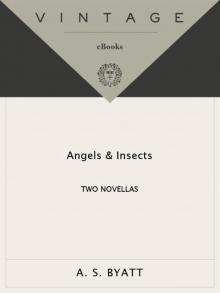 Angels and Insects
Angels and Insects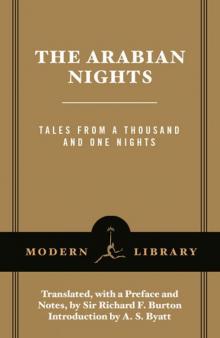 The Arabian Nights: Tales from a Thousand and One Nights (Modern Library Classics)
The Arabian Nights: Tales from a Thousand and One Nights (Modern Library Classics)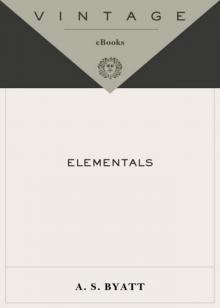 Elementals
Elementals